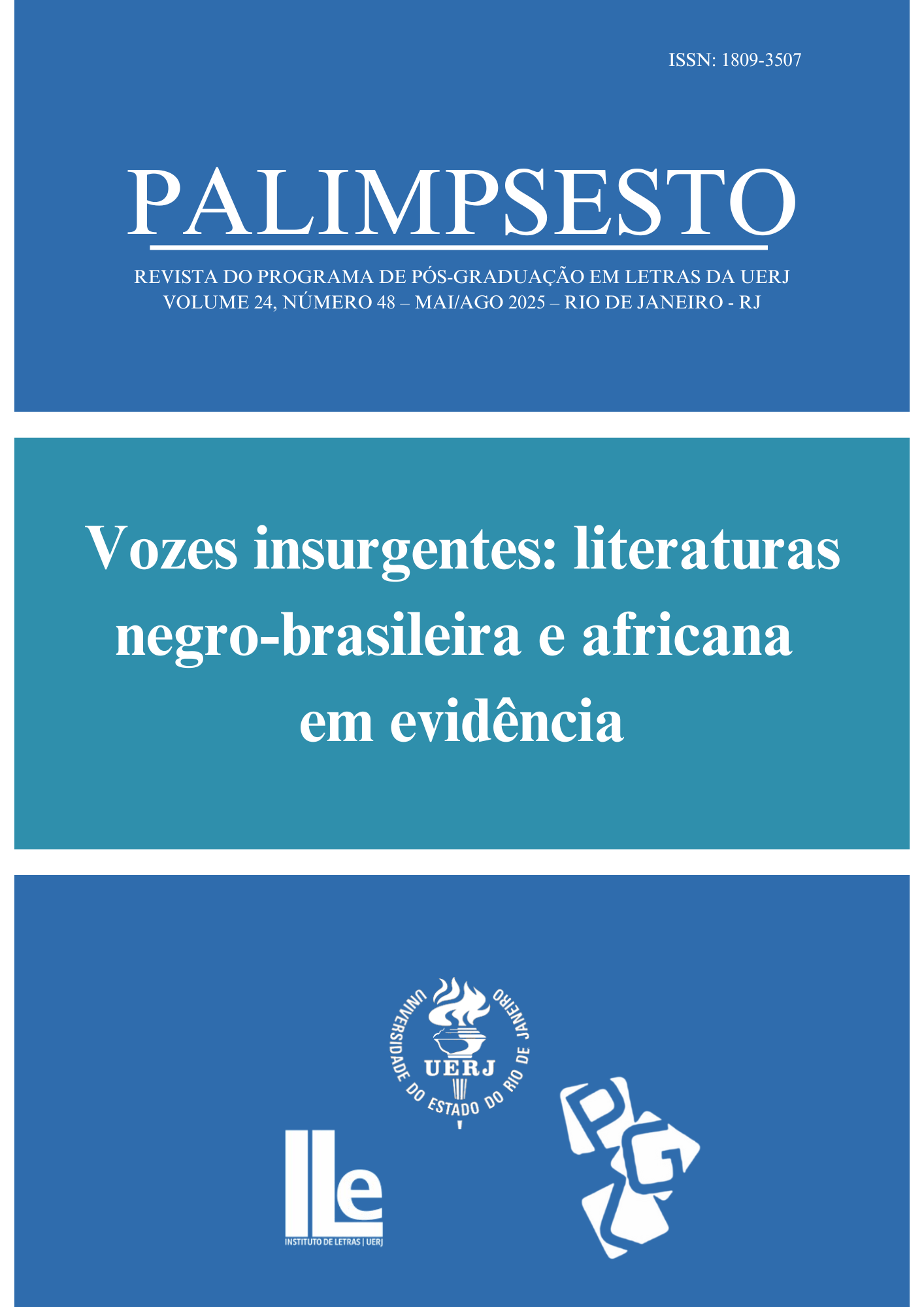Macabéa, Flor de Mulungu: the rewriting of Conceição Evaristo
DOI:
https://doi.org/10.12957/palimpsesto.2025.88957Keywords:
Keywords: Rewriting, Experiences, Racism, Whiteness.Abstract
Based on the analysis of Macabéa, Flor de Mulungu by Conceição Evaristo, the article will analyze how, through language and the concept of ‘writing’, Evaristo constructs Macabéa’s subjectivity and makes her resurface from her place of subalternity. Responding to the writer Clarice Lispector, who provides the starting point in denouncing racism and the ideals of whiteness, themes little known at the time of the military dictatorship in a country that believed in the myth of racial democracy, Conceição rewrites the character of A Hora da Estrela, narrated by a white man from Rio de Janeiro, Rodrigo S. M. Based on a theoretical framework of black women: Gonzalez (1984, 1988), Santos (2021) Spivak (2018) Lugones (2010), the idea is to show how the character resurfaces after 35 years, given the countless social transformations that have occurred in Brazil, such as the 1988 Constitution, and its consequences since then.
Downloads
References
Angu de Grilo: 5 anos, ao vivo com Conceição Evaristo. Locução de Flávia Oliveira e Isabela Reis: Rio de Janeiro: 25 de agosto de 2024. Angu de Grilo. Disponível em: https://open.spotify.com/episode/1xlw41VnHn5PFGFRX65OEO. Acesso em: 02/10/2024.
BENTO, Cida. O pacto da Branquitude. 1ª ed- São Paulo: Companhia das Letras, 2022.
CRENSHAW, Kimberlé. Documento para o encontro de especialistas em aspectos da discriminação racial relativos ao gênero. Estudos Feministas. Ano 10 vol. 1, 2002. Disponível em http://www.scielo.br/pdf/ref/v10n1/11636.pdf> Acesso em: 23 abril. 2021.
EVARISTO, Conceição. Da grafia-desenho de Minha Mãe, um dos lugares de nascimento de minha escrita. Mesa de Escritoras Afro-brasileiras. XI SEMINÁRIO NACIONAL MULHER E LITERATURA/II SEMINÁRIO INTERNACIONAL MULHER E LITERATURA, Rio de Janeiro, 2005. Disponível em: http://nossaescrevivencia.blogspot.com/search?q=grafia+desenho+de+minha+m%C
3%A3e. Acesso em: 27 de setembro de 2024.
EVARISTO, Conceição. Insubmissas lágrimas de mulheres. Belo Horizonte: Nadyala, 2011.
EVARISTO, Conceição. Olhos D’Água. 1ª ed- Rio de Janeiro: Pallas: Fundação Biblioteca Nacional, 2016
GONZALEZ, Lélia. Por um feminismo afro latino americano: ensaios, intervenções e diálogos/organização Flávia Rios, Márcia Lima – 1ª ed, - Rio de Janeiro, Zahar, 2020.
GONZALEZ, Lélia: primavera para as rosas negras. Rio de Janeiro: UCPA Editora, 2018.
HOLANDA, Heloísa Buarque (org). Explosão Feminista: arte, cultura, política e universidade. 2ª ed. São Paulo: Companhia das Letras, 2018.
HOLANDA, Heloísa Buarque. Pensamento feminista brasileiro: formação e contexto. Rio de Janeiro: Bazar do Tempo, 2019.
HOLANDA, Heloísa Buarque. Pensamento feminista brasileiro: conceitos fundamentais. Rio de Janeiro: Bazar do Tempo, 2019.
KILOMBA, Grada. Memórias da plantação: episódios de racismo cotidiano. Rio de Janeiro: Cobogò, 2019
LISPECTOR, Clarice. A hora da estrela [recurso eletrônico] / Clarice Lispector. – Rio de Janeiro: Rocco Digital, 2013.
MEDEIROS, V.L.C. Luzes difusas sobre o verde-amarelo: questões brasileiras na perspectiva de Clarice Lispector. Tese de Doutorado defendida em 2002 pela Universidade Federal do Rio Grande do Sul. Disponível em: https://lume.ufrgs.br/handle/10183/15015#
LUGONES, Maria. In: Pensamento Feminista hoje, perspectivas decoloniais. Org: Heloísa Buarque de Holanda. Rio de Janeiro, Bazar do Tempo, 2020.
PAIXÃO, Mayara. O Movimento Negro e a Constituição de 1988: uma revolução em andamento. https://www.brasildefato.com.br/especiais/o-movimento-negro-e-a-constituicao-de-1988-uma-revolucao-em-andamento acesso em 21/07/2024
SOUZA. Neusa Santos. Tornar-se negro: ou as vicissitudes da identidade do negro brasileiro em ascensão social. Rio de Janeiro: Zahar, 2021.
SPIVAK, Gayatri Chakravorty. Pode o Subalterno falar? tradução de Sandra Regina Goulart Almeida, Marcos Pereira Feitosa, André Pereira Feitosa. – Belo Horizonte: Editora UFMG, 2010. p. 66-67.
Downloads
Published
How to Cite
Issue
Section
License
Palimpsesto journal publishes original articles and reviews in the field of Literature, Language and Linguistics. We also publish mixed and/or thematic issues, with articles and reviews in Portuguese, English, Spanish, and French.
Authors retain copyright and grant the journal the right of its first publication, with the work simultaneously licensed under Creative Commons Attributions License, which allows sharing of the work with an acknowledgement of authorship and initial publication in this journal.

Palimpsesto uses a Creative Commons - Atribuição-NãoComercial 4.0 Internacional license.







